AI in HR: 4 Use Cases for SMBs
According to Gartner's 2022 CIO and Technology Executive Survey, only 6% of organizations have no interest in deploying artificial intelligence (AI). [1] For context, nearly half (47%) of the organizations polled at the time had already deployed or were planning to deploy AI within the next 12 months.
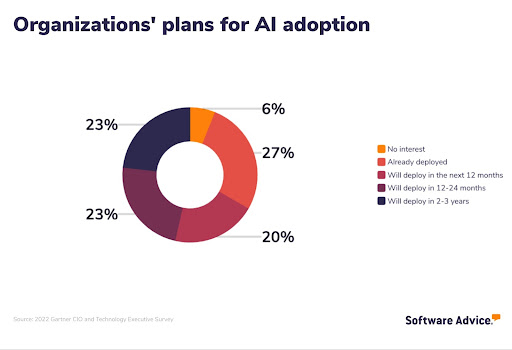
As an HR leader at a small to midsize business (SMB), you might find yourself in between these two groups—interested in the benefits AI could bring to your organization but unsure of how this technology can transform your business function. Understanding how other HR departments are using AI and educating yourself on the challenges of this innovative technology will help you determine whether your SMB could benefit from implementing AI.
With the help of research from Gartner, we'll dive into the specifics of the technology that’s being used to accomplish each use case and prepare you for this new iteration of HR by introducing considerations before adopting AI. [1]
A snapshot of AI in HR
According to a survey conducted by The Society for Human Resource Management (SHRM), 24% of midsize organizations (defined here as having between 100 and 499 employees) are already using automation and/or AI to support HR activities [2]:
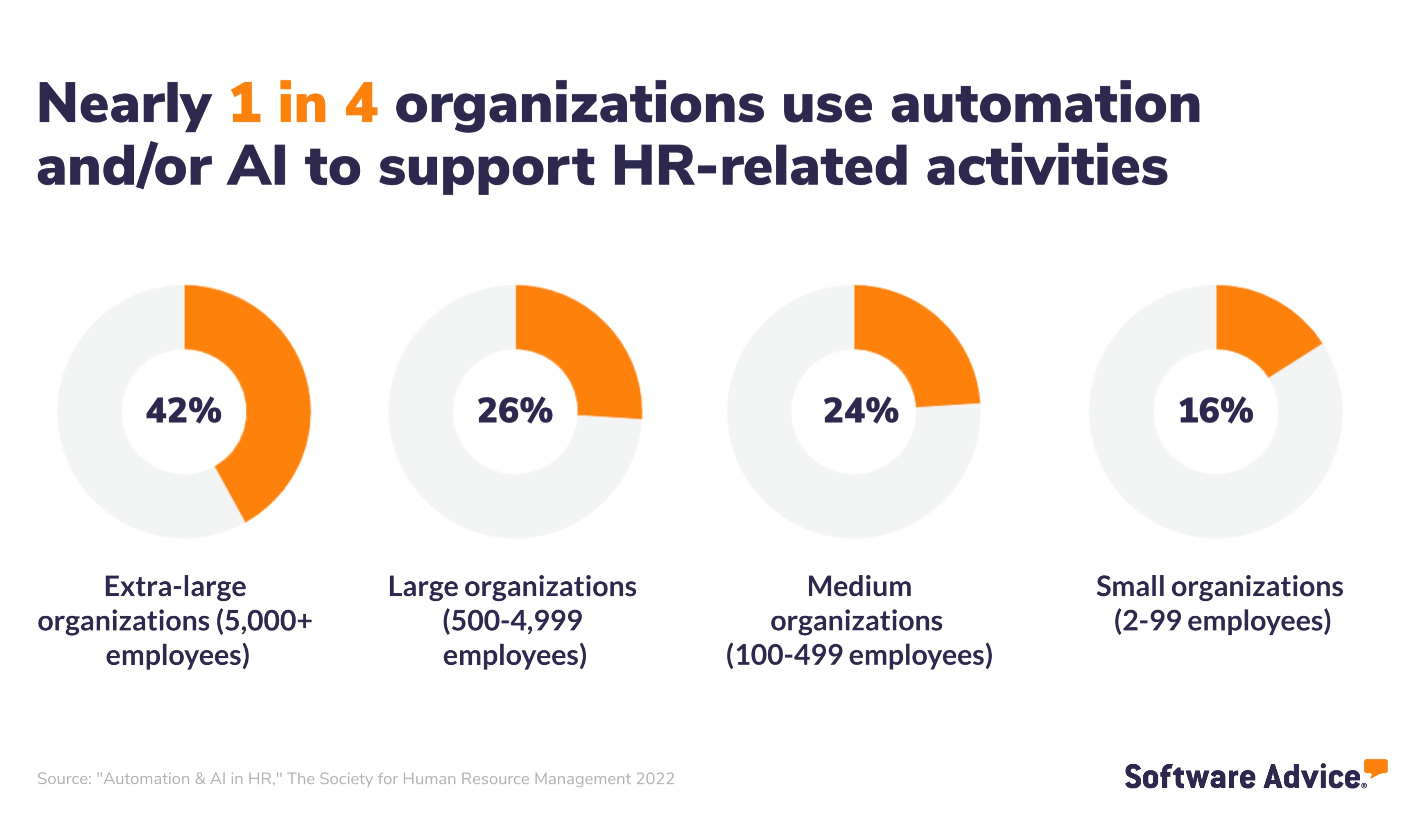
When asked what areas of HR they are currently using automation and AI for, the top three answers from respondents were:
Recruitment and hiring (79%)
Learning and development (41%)
Performance management (38%)
Further, 25% of respondents indicated that their organization was planning to start using or to increase their use of automation or AI in recruitment and hiring over the next five years, which is in line with research from Gartner: In a 2023 survey, 31% of HR leader respondents rate recruiting AI as a top emerging use case for HR technology. [3]
With that in mind, let’s take a look at four use cases for AI in HR, starting with how it can be applied to the talent acquisition process.
1. Sourcing talent
Automated candidate sourcing is currently the most popular use of AI in HR. In Gartner's 2022 Recruiting Innovations Survey, recruiting leaders were asked where in the recruitment process AI is currently used, and automated candidate sourcing and sourcing tools were the most-cited use cases. [4]
Automated candidate sourcing is a passive recruiting technique that uses AI to find, screen, and engage with talent. Hiring teams work with this tech by defining the qualifications they're looking for in a candidate (including preferred skills, location, or prior work experience). Then, an AI aggregator will scour websites like Indeed or LinkedIn for professionals who meet those criteria and create a pool of potential applicants based on their findings.
Other facets of AI sourcing include automated communications—for instance, some systems can be set up to send an outreach email inviting candidates to apply for an open position.

Manually sourcing candidates is a time-consuming task for recruiters. Automating this part of the process can reduce time-to-fill and increase the chances of making a high-quality hire, and this kind of technology is becoming more and more common in today's recruiting software platforms.
On the topic of candidate sourcing: Expand Your Candidate Pool With These 6 Recruitment Sourcing Strategies
2. Screening applicants
AI screening tools sort through applicants' resumes to find the most qualified candidates and move them forward in the recruitment process. In most cases, AI screening is executed through skill-matching algorithms—AI models that are trained to determine how closely a resume matches a job description.
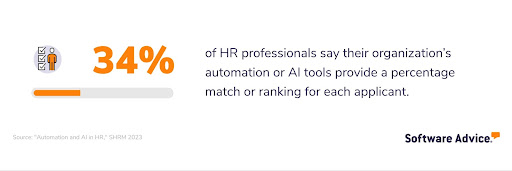
In other cases, AI screening is executed through natural language processing (NLP). With this approach, the contents of an applicant's resume are parsed in order to extract the most relevant information. Then, a summary is created for recruiters to review.
Software Advice's HR Chatbot Survey polled HR professionals about their use of conversational AI tools.* When asked which tasks they have used ChatGPT or similar conversational chatbots for, 72% of participants said that they use a chatbot to summarize or evaluate job applicant resumes or cover letters.
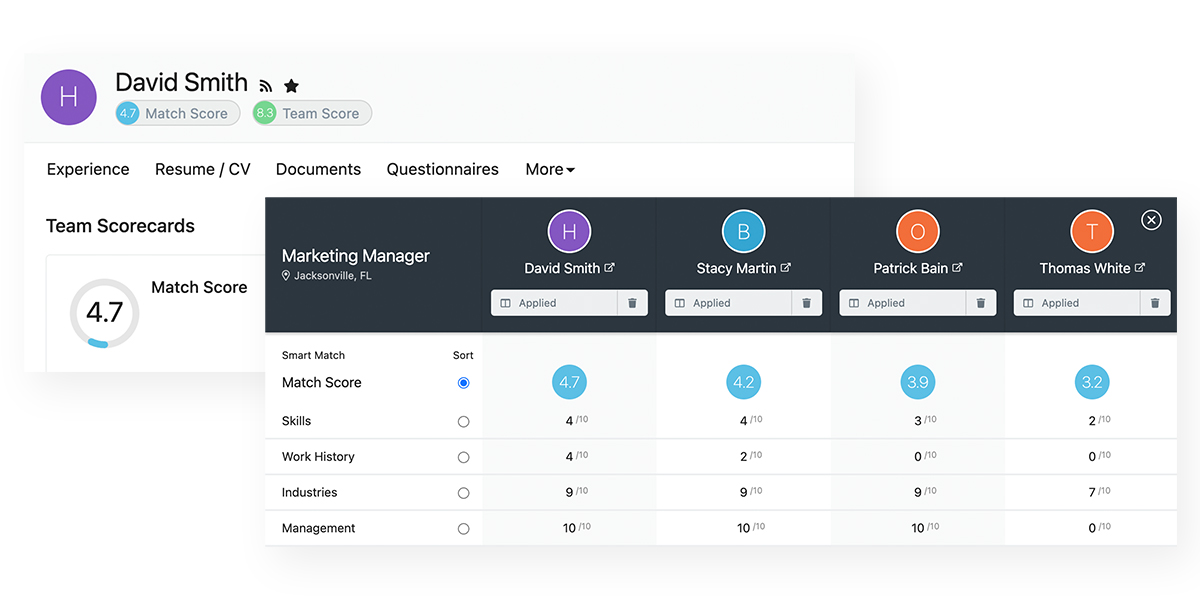
Resume screening is often considered the most time-consuming part of the hiring process. Some sources claim that screening resumes to match an applicant to a role takes between 23 to 24 hours—more than half of a full-time recruiter’s workweek. [7] Considering this, it's worth evaluating whether your current screening process could benefit from some level of automation.
3. Fielding routine HR requests
The use of conversational AI solutions such as chatbots and virtual assistants (VA) in HR has exploded over the last five years. For instance, our survey found that 40% of small businesses (250 employees or less) and 55% of midsize businesses (1000 employees or less) already have an HR chatbot.* And even more compelling, of the small businesses who did not have an HR chatbot at the time of our survey, 49% stated that they were considering implementing one in the future.
HR chatbots work through Natural Language Understanding (NLU), an application of generative AI that understands text or speech input from humans. Employees can interact with HR chatbot to get answers about internal policies, benefits, perks, and more.
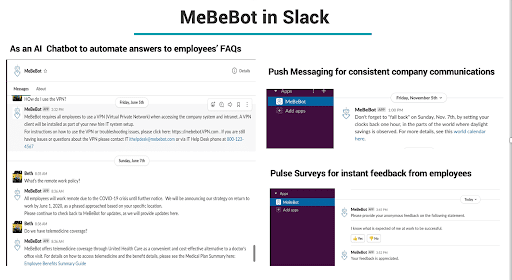
An employee asks MeBeBot about their organization’s remote work policy [8]
When asked what employees are primarily using their HR chatbot for, here's what our survey participants had to say:
Getting answers to company policy and process questions (71%)
Updating their personal information (69%)
Learning more about job openings (69%)
Applying for jobs (60%)
From this it's easy to glean that HR chatbots are typically used to field routine requests from employees. This means that implementing a chatbot or virtual assistant can help free up your HR team members to focus on more strategic tasks, while employees get instant answers to their questions, boosting their overall experience.
Interested in outsourcing productivity drains to a VA or chatbot? Browse our HR software directory.
4. Strategic skills development
AI-enabled skills management is one of the newest frontiers of AI in HR. Here’s how Gartner defines this technology [9]:
Without AI, skills management is an ongoing undertaking for HR teams that involves determining what kind of skills would be valuable to track, collecting and analyzing said skills data, and creating skills development programs that align with organizational priorities.
On the topic of skills development: Future-Proof Your Workforce With Talent Mapping
It's worth mentioning that AI-enabled skills management does not mean that this aspect of talent management can be fully automated. Instead, HR professionals have to work with this technology—mostly in the form of updating job descriptions and skills taxonomies.
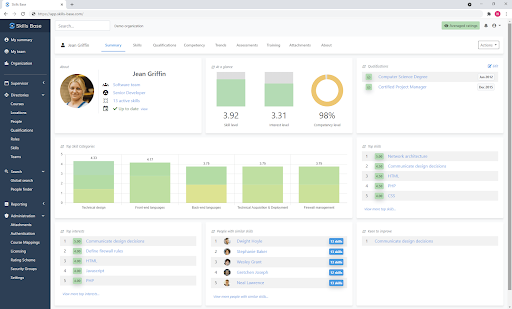
An employee’s skill data visualized in Skills Base [10]
Currently, AI-enabled skills management is an emerging feature in HCM suites, talent acquisition solutions, learning experience platforms, and stand-alone skills management solutions such as the platform in the screenshot above.
Certain business sectors—such as finance, design, media, HR, and IT—have more rapidly changing skill needs than others. If your SMB fits in this group, AI-based skills management is worth looking into further. We suggest asking your current HR software vendor whether they offer this tech or plan to within the next few years.
Need someone on your side? Get the Most Value Out of Your Software Search by Talking to Our Advisors
4 reasons why organizations are hesitating to adopt AI
Although AI can be revolutionary when applied to the HR function, there are a few reasons why organizations are hesitating to use it. According to a study from The Society for Human Resources Management, the top four reasons why organizations don't use AI are as follows [2]:
Lack of resources (time, money, and labor) to properly audit or correct AI algorithms
A lack of knowledge about what tools would best fit their needs
Automation or AI lacks "the human touch"
Can't afford to implement automation or AI
It takes a significant amount of time and money to successfully implement any new tech into a business's operations. But this is especially true when it comes to AI, because in addition to model building, artificial intelligence requires collecting and cleaning data and frequent re-training.
For help determining whether AI would be a worthwhile investment for your business check out our content: 4 Non-Traditional Metrics for Software ROI.
Next step: Get in touch with your software provider
Based on the use cases covered in this guide, there's no denying that AI technology has a place in HR processes. However, today’s HR leaders need to be thoughtful when it comes to advocating for new tech.
Even if your business doesn't have the know-how or resources to build artificial intelligence models in-house, you can start experimenting with this tech in small ways right now. Many HR software vendors are working AI into their platforms in the form of features and functions that don’t require extensive maintenance or up-front work to use.
As a next step, talk with your provider about how they're applying AI to their solution. Or, get in touch with one of our Software Advisors to receive a shortlist of platforms that could work for your needs and budget.
In the meantime, AI isn't the only HR trend worth learning more about. Check out these related links:
Survey methodology
*Software Advice's 2023 HR Chatbot Survey was conducted in March 2023 among 300 HR employees at U.S. companies to understand how they're leveraging chatbots in their current job.
Sources
Automation & AI in HR, SHRM
AI in HR: What HR Leaders Need to Know About Generative AI, Gartner
Breezy HR Launches Candidate Match Score, Breezy HR
11 steps to an efficient resume screening process, Freshteam
MeBeBot in Slack, MeBeBot
Innovation Insight for AI-Enabled Skills Management, Gartner
A Skills-Based Technology Platform Helping People, Teams and Organizations, Skills Base